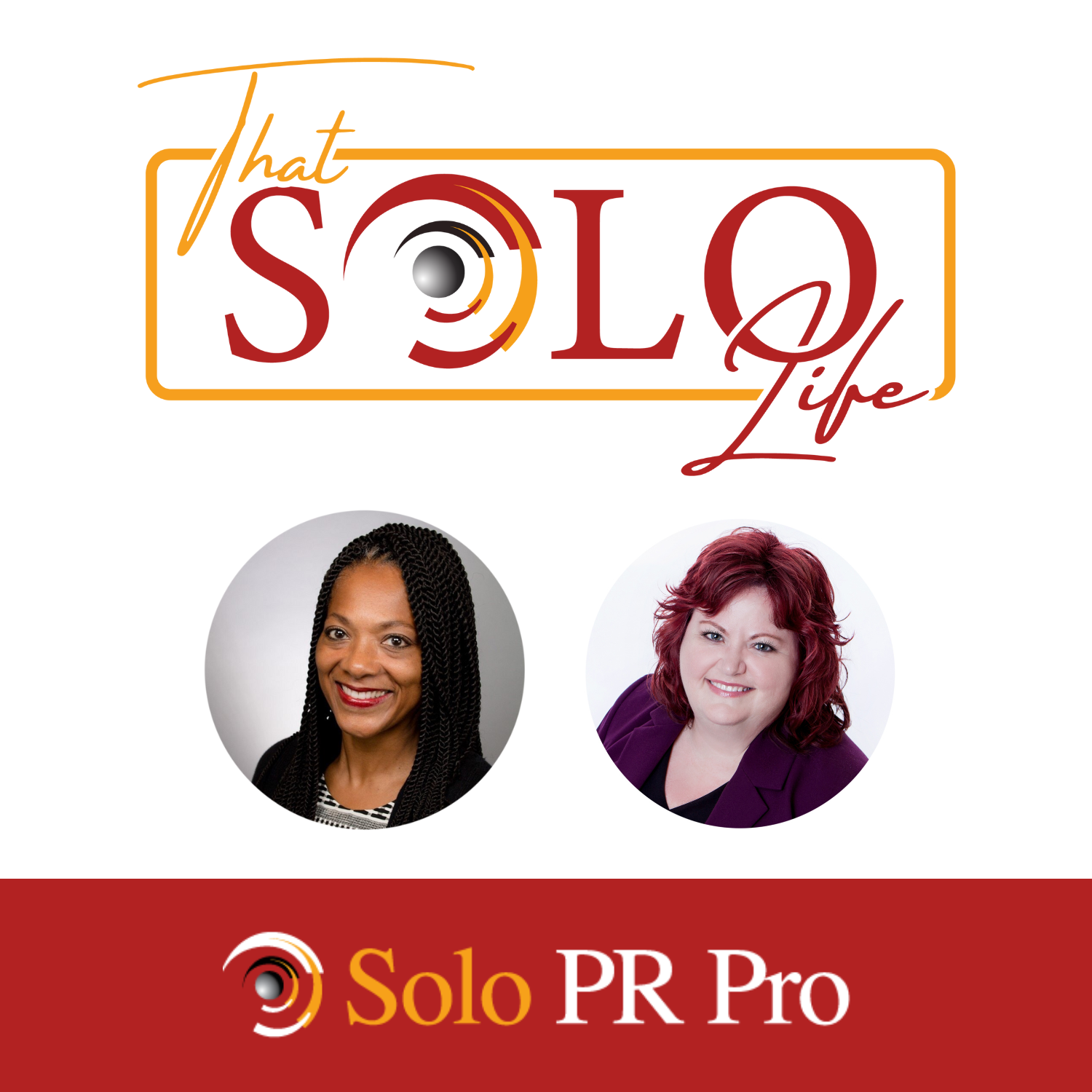
31.4K
Downloads
333
Episodes
That Solo Life: Co-hosted by Karen Swim, founder of Words for Hire, LLC and owner of Solo PR Pro and Michelle Kane, founder of VoiceMatters, LLC, we keep it real and talk about the topics that affect solo business owners in PR and Marketing and beyond. Learn more about Solo PR Pro: www.SoloPRPro.com
That Solo Life: Co-hosted by Karen Swim, founder of Words for Hire, LLC and owner of Solo PR Pro and Michelle Kane, founder of VoiceMatters, LLC, we keep it real and talk about the topics that affect solo business owners in PR and Marketing and beyond. Learn more about Solo PR Pro: www.SoloPRPro.com
Episodes
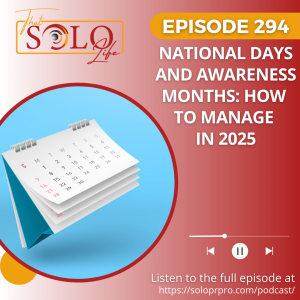
Monday Apr 07, 2025
National Days and Awareness Months and How to Manage in 2025
Monday Apr 07, 2025
Monday Apr 07, 2025
That Solo Life, Episode 294: National Days and Awareness Months and How to Manage in 2025
Summary:
This podcast episode discusses the abundance of "national days" and how PR professionals and marketers should approach aligning their client initiatives with these events. The key points are:
- There is an overwhelming number of these "national days" which can become diluted and ignored by the public.
- These days can be divided into two categories: awareness/educational campaigns vs. marketing-driven events.
- For awareness months/days related to important causes, it can make sense to align content and messaging if it's relevant to the client's business. However, marketers should be cautious about aligning with more frivolous "national days" just for the sake of participation.
- The most important factor is whether the client's news, announcement, or content is truly newsworthy and valuable, regardless of whether it aligns with a designated national day or month. Forcing an announcement to fit a particular calendar event is not advised.
- PR professionals should set clear expectations with clients about which national days/months are worth aligning with versus when it may be better to simply focus on the strength of the news itself.
In This Episode
Are you overwhelmed by the never-ending list of national days, weeks, and months? From National Hot Dog Day to Domestic Violence Awareness Month, it feels like every moment in the calendar is claimed by something. But does your brand have to jump on every single one?
In today’s episode, co-hosts Karen Swim, APR (Solo PR Pro) and Michelle Kane (Voice Matters) discuss how to strategically decide which awareness and marketing campaigns to align with (and when to pass). They share practical advice for PR pros, marketers, and business owners on how to cut through the clutter while staying authentic to your brand.
What We Discuss in This Episode:
- The evolution of National Days and how their popularity has changed over time.
- The difference between awareness campaigns that educate (e.g., Autism Awareness Month) versus marketing-driven moments (e.g., National Ice Cream Day).
- Why staying true to your brand’s mission is key when deciding whether to participate.
- Evaluating client expectations and helping them decide if their campaigns align with specific days or months.
- How doing something outside of a marketing or awareness month can sometimes help your message stand out.
- Tips for advising clients on when their big news deserves attention at the right time.
Key Takeaways:
- Not every campaign is necessary. Assess whether a national day or awareness month is relevant and meaningful to your brand or clients before joining in.
- Awareness vs. gimmicks: Distinguish between educational campaigns that offer real value and marketing "fun" that may not add much.
- Timing is everything. Great news is great news, no matter what day you share it. Don’t feel tied to these campaigns if they don’t serve your goals.
Listener Reminder:
We’re not throwing shade at National Donut Day (a very worthwhile occasion, honestly!), but don’t feel obligated to latch on to every trendy day in the calendar. Use these moments as tools—but only when they make sense for your brand!
Mentioned in This Episode:
- How to align content with National Days effectively without overwhelming your brand strategy.
- Examples of when leveraging awareness months like Domestic Violence Awareness Month can reinforce your brand’s values.
Special Invite:
If you found value in today’s conversation, we’d love for you to share this episode with your network! Whether via audio or on YouTube (yes, you can see our fabulous faces there too!), your support helps us bring more tips to PR and marketing pros like you. And don’t forget to leave us a rating or review—we can handle it 😉
Thanks for listening to this episode of That Solo Life! Until next time!
Follow Us:
- Michelle Kane | Voice Matters
- Karen Swim | Solo PR Pro
- Podcast Website | That Solo Life
Have thoughts on today's topic? Connect with us on social media and share your perspective.
Enjoyed the episode?
Please leave a review here - even a sentence helps. Share and tag us (@SoloPRPro) on social media so that we can thank you personally!
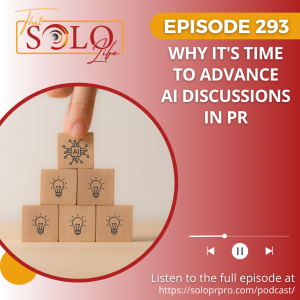
Monday Mar 31, 2025
Why It's Time to Advance AI Discussions in PR
Monday Mar 31, 2025
Monday Mar 31, 2025
That Solo Life, Episode 293: Why It's Time to Advance AI Discussions in PR
In This Episode
Join Karen Swim, APR and Michelle Kane as they discuss how PR professionals can leverage AI to enhance productivity while maintaining ethical practices. From practical applications for tasks like research and content creation to addressing AI's challenges, this episode offers valuable insights into how professionals can integrate AI tools to work more efficiently.
What We Cover in This Episode:
- MuckRack's "State of AI in PR" report and key takeaways
- Why PR pros need to move beyond basic AI usage (like content and journalist research)
- Practical examples of how to use AI to save time, like creating campaign templates, summarizing research, or simplifying technical content
- The importance of staying ahead with AI to offer strategic counsel to clients
- How to address misconceptions about AI and demonstrate your own value as a professional in a tech-driven world
- Ethical considerations and creating responsible AI use policies
Why You Should Listen:
AI is here to stay, and PR professionals must not only adapt but also lead the conversation in how this technology influences communication. Whether you're already using AI in advanced ways or you're hesitant to try, this episode addresses the need to learn to integrate AI into your workflows effectively and responsibly.
Episode Highlights:
- “What we’re saying is to use AI to simplify repetitive tasks and preserve your expertise for what truly matters.”
- “AI isn’t a vending machine. It’s not magic. It’s only as good as what you input, but it’s a powerful assistant when used well.”
- “Helping clients craft AI use policies not only protects them but also establishes you as a forward-thinking, trusted advisor.”
Key Points:
In this episode, Karen and Michelle discuss the use of AI in public relations and communication practices. The key points are:
- The PR industry has been slow to adopt AI, focusing on limited use cases like content creation and journalist research, rather than exploring more efficient and strategic applications.
- AI can be a valuable tool for PR professionals, helping with repetitive tasks, research analysis, content writing, and developing campaign templates - freeing up time to focus on high-value, human-centric activities.
- There are ethical considerations around AI usage that PR professionals should be aware of and address, such as developing AI use policies and monitoring for potential misuse or negative impacts.
- PR professionals should make an effort to understand AI capabilities and how to leverage the technology responsibly, as it is an increasingly important part of the communication landscape.
Links and Resources Mentioned:
Connect with Us:
- Visit our website: Solo PR Pro
- Share your thoughts and feedback: info@soloprpro.com
- Follow us on Instagram
Listen Now: Apple Podcasts | Spotify | Solo PR
Enjoyed the episode?
Please leave a review here - even a sentence helps. Share and tag us (@SoloPRPro, @KarenSwim) on social media so that we can thank you personally!
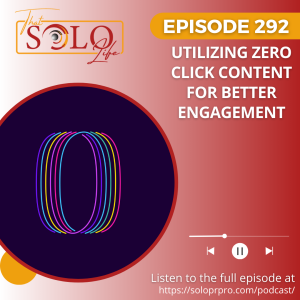
Monday Mar 24, 2025
Utilizing Zero Click Content for Better Engagement
Monday Mar 24, 2025
Monday Mar 24, 2025
That Solo Life, Episode 292: Utilizing Zero Click Content for Better Engagement
In This Episode
In this episode of That Solo Life, co-hosts Karen Swim, APR and Michelle Karen discuss zero click content, a concept that is gaining traction in digital marketing and public relations.
As the hosts explore zero click content, they discuss how this approach shifts the focus from merely driving clicks to fostering genuine engagement with your audience. Traditionally, the mantra has been to lead potential clients to our websites, but zero click content allows you to present valuable information in a more digestible format—whether through short text, videos, or engaging visuals—without the need for a direct call to action like "click here."
Karen and Michelle highlight the psychological aspect of this strategy, noting that it encourages potential clients to seek out more information on their own, thereby building trust and establishing your clients as go-to resources in their respective fields. This approach also allows PR pros to be creative in their communications. By telling compelling stories and using plain language, we can captivate our audience and encourage them to engage with our content.
Throughout the episode, Michelle and Karen discuss practical ways to implement zero click content, such as utilizing social media platforms creatively and producing engaging video content that doesn't require a formal setup. They also touch on the importance of adapting to the changing landscape of search engine optimization (SEO) driven by AI, where bite-sized, meaningful responses to audience questions are becoming increasingly vital.
Listeners are encouraged to experiment with their own content creation, using tools like CapCut and Animoto to produce engaging videos and infographics.
Have you used zero click content? We would love to hear about your experiences so that we can all learn and grow. Drop us a line at info@soloprpro.com.
Don't forget to subscribe, like our content, and connect with us—we love hearing from you!
Episode Timestamps
00:00:00 - Introduction to That Solo Life Join hosts Michelle Kane and Karen Swim as they introduce the podcast and acknowledge the challenges faced by PR pros and marketers who work for themselves.
00:00:33 - Shout Out to Caregivers Acknowledge the multitasking nature of PR pros who also serve as caregivers, highlighting the chaos of balancing work and personal responsibilities.
00:00:54 - Introduction to Zero Click Content Discussion on the concept of zero click content and how it shifts the focus from driving clicks to fostering true engagement.
00:01:47 - Engagement Over Clicks Exploring the psychological aspect of zero click content and its role in building trust and establishing authority.
00:02:34 - Creativity in Content Creation How zero click content encourages creativity and storytelling, allowing for diverse formats like visuals and short videos.
00:03:45 - Adapting to Changing Search Trends The importance of adapting to changes in search algorithms and how zero click content can enhance visibility and engagement.
00:04:37 - Interactivity and Serialization Discussing the potential for interactivity in content and the benefits of serializing information to keep audiences engaged.
00:05:56 - The Importance of Bite-Sized Information Emphasizing the need for concise, meaningful responses that resonate with audiences and improve search results.
00:07:18 - Refocusing Content Priorities A reminder that shifting to zero click content is a small pivot rather than a complete overhaul, aimed at building awareness.
00:08:03 - Building New Skills Encouragement to embrace new content strategies as a way to stand out and improve communication with clients.
00:09:49 - Practical Tools for Content Creation Recommendations for tools like CapCut and Animoto to help create engaging video content and repurpose existing materials.
00:10:58 - Engaging with the Audience Invitation for listeners to share their experiences and tips on zero click content, fostering community interaction.
Resources / Links Mentioned:
- [What Data Says] Zero Click Content for Social Media - Social Insider
- LinkedIn Discussion on Zero Click Searches - Nitin Manchanda
- Is SEO Dead in 2025? - Neil Patel
Listen Now: Apple Podcasts | Spotify | Solo PR
Enjoyed the episode?
Please leave a review here - even a sentence helps. Share and tag us (@SoloPRPro, @KarenSwim) on social media so that we can thank you personally!

Monday Mar 17, 2025
Personal And Professional Challenges Of Cybercrime
Monday Mar 17, 2025
Monday Mar 17, 2025
Episode Summary:
Cybercrime is advancing at an alarming rate, impacting both personal lives and professional industries—including public relations. Karen Swim, APR of Solo PR Pro and Michelle Kane of Voice Matters explore the latest tactics scammers are using, from phishing emails to fraudulent links, and how PR professionals can protect themselves and their clients in this evolving digital landscape.
What You’ll Learn:
- Personal tips to guard against scams like phishing texts, spoofed calls, and fraudulent emails.
- Why vigilance is key for protecting private information and financial assets.
- How PR professionals can ensure their campaigns and communications build trust and avoid looking suspicious to audiences.
- Tools and best practices for managing online safety, such as masking your email and avoiding suspicious links.
- Insight into building trustworthy client relationships in a world full of online threats.
Memorable Moments:
- Michelle’s bank fraud story: How trusting her instincts helped her avoid a scam.
- Karen’s best advice: “Never answer unknown numbers. Call back the verified line instead.”
- Top tip for PR pros: Ensure your links and downloads are hosted on client websites to build credibility and assure safety.
Episode Timestamps
- 00:00:00 - Introduction to Online Fraud
- 00:00:42 - Personal Experience with Scams
- 00:01:40 - Best Practices for Handling Unknown Calls
- 00:02:40 - The Rise of Cyber Attacks
- 00:03:40 - Protecting Your Personal Information
- 00:04:40 - The Importance of Trust in Communication
- 00:05:40 - Navigating Links and Downloads Safely
- 00:06:40 - Building Trust with Your Audience
- 00:07:40 - Avoiding Scams in Promotions
- 00:08:40 - Vigilance in Everyday Life
- 00:09:40 - Resources for Staying Informed
- 00:10:40 - Conclusion and Call to Action
Resources / Links Mentioned:
- Know to Protect - Toolkit for tips to stay safe online
- Krebs on Security - Security expert that shares information on security threats
- Shelley DeMotte Kramer - technology expert who shares digestible insights on cybercrime and security trends.
- The Hacker News - Good news source for cyberthreats
- CSO online - News and info site for CSOs, but good place to keep up
- What is Two-Factor Authentication - TechTarget
- Apps and services for masking phone numbers and email addresses.
- The Opt-Out Project - services and steps for cybercleansing
- Burner App - can set up multiple “burner” numbers on your cell that allow you to call and send from your cell phone
- Apple Hide My Email
Have you or your clients been affected by cybercrime? Share your experiences in the comments or on social media to help others stay one step ahead. And if you found this episode helpful, don’t forget to share it with your colleagues and fellow PR professionals.
Listen Now: Apple Podcasts | Spotify | Solo PR
Enjoyed the episode?
Please leave a review here - even a sentence helps. Share and tag us (@SoloPRPro, @KarenSwim) on social media so that we can thank you personally!

Monday Mar 10, 2025
The Good, The Bad, and The Ridiculous of Wordplay
Monday Mar 10, 2025
Monday Mar 10, 2025
Summary:
Words have power, and as PR pros and marketers, we know just how to wield them. But what happens when wordplay goes awry? Join Michelle Kane and Karen Swim in this enlightening and entertaining episode as they break down the dos and don'ts of clever messaging. Discover how the right wordplay can resonate with your audience, when it’s best avoided, and how intention matters more than you might think.
Key Takeaways:
- Wordplay as a Connection Tool: Learn how effective wordplay can draw in and unify your audience by balancing the familiar with a fresh twist.
- Intent Is Everything: Messaging should always prioritize kindness and respect, avoiding divisiveness or harm.
- The Fine Line Between Clever and Confusing: Not all wordplay lands well—find out how to avoid messaging that alienates or baffles your audience.
In This Episode
In this episode of That Solo Life, co-hosts Karen Swim and Michelle Kane chat about the use of wordplay in communication and marketing. They cover examples of effective wordplay, such as the Nike and Apple ads, as well as instances of problematic wordplay, like renaming the Gulf of Mexico or a steak cut. The discussion highlights include:
-
Wordplay can be an effective communication tool when used strategically to engage the audience and build familiarity.
-
However, wordplay should not be used as a "weapon" to divide audiences or make a political statement.
-
Communicators should be mindful of the intent and potential impacts of their word choices, and aim to communicate in a spirit of kindness and unity.
-
It's important for communicators to maintain credibility and avoid actions that could undermine trust.
Resources/Links Mentioned:
- ‘Freedom never tasted so good’: How Walter Jones helped rename french fries over the Iraq War - The Washington Post
Why Wordplay Works in Communications - Wylie Communications
- Why Wordplay Works: The Science of Puns in Business Communication - Copy That Communications
Enjoyed the episode?
Please leave a review here - even a sentence helps. Share and tag us on social media (@SoloPRPro, @KarenSwim, @VoiceMattersLLC) and let us thank you personally!

Monday Mar 03, 2025
The New Challenges in Managing Brand Reputation
Monday Mar 03, 2025
Monday Mar 03, 2025
That Solo Life, Episode 289: The New Challenges in Managing Brand Reputation
Summary
This episode of "That Solo Life" podcast explores the challenges PR professionals manage when brands are faced with crises, particularly serious situations like allegations of child abuse. The hosts, Karen Swim, APR and Michelle Kane discuss the importance of building trust with audiences, maintaining authenticity and integrity, and providing nuanced responses rather than knee-jerk reactions. They emphasize the need for civility, context, and an understanding that not every mistake or misstep warrants an extreme public backlash. The hosts also acknowledge the difficulty of navigating these issues as PR professionals who are also impacted by the toxicity and chaos in the broader society.
In This Episode
Karen Swim, APR and Michelle Kane discuss the modern complexities of reputation management and proactive crisis management in Episode 289 of That Solo Life. The internet has created a tinderbox that can quickly ignite a spark of discord into a firestorm of crisis.
Today’s discussion kicks off with a real-life example of a local business facing severe allegations of child abuse linked to previous ownership. Michelle and Karen explore the challenges that new ownership faces as they attempt to distance themselves from the past while managing public perception. They emphasize the importance of effective messaging and the need for PR professionals to guide brands through these turbulent waters.
Karen highlights the broader context of how society has shifted towards a more polarized viewpoint, where nuance and reasoned thinking seem to be in short supply. The hosts discuss the tendency for public opinion to swing dramatically, often overlooking the complexities of individual situations. They stress the importance of context in evaluating a brand's response to crises, noting that not every misstep warrants immediate condemnation.
As the conversation unfolds, Karen and Michelle reflect on the pressures brands face in the digital age, where the loudest voices often drown out the majority who may hold more moderate views. They point out that while brands must be authentic and true to their values, they also need to build trust with their audiences over time. This trust becomes crucial when navigating crises, as it can help mitigate backlash and foster understanding.
The episode also touches on the rapid spread of misinformation and the consequences it can have on brand reputation. The hosts share a recent example involving a soda company that faced backlash over a marketing campaign, illustrating how quickly narratives can spiral out of control without proper context.
In closing, Karen and Michelle encourage PR professionals to remain steadfast in their values and to continue making ethical decisions, even amidst chaos. They express hope for a return to civility and nuance in public discourse, emphasizing that by doing the right thing, we can collectively contribute to a more informed and understanding society.
Listeners are invited to share their thoughts and experiences, and the hosts encourage feedback on topics they would like to see covered in future episodes. As always, they thank their audience for tuning in and remind them to check out the resources available at SoloPRPro.com.
Resources:
- What I Learned from The Chaos Machine - Fran Stephenson, APR
- If You Run From AI, It Will Find You — Here's Why Traditional Reputation Strategies No Longer Work - Entrepreneur
Episode Timestamps
00:00:00 - Introduction to That Solo Life Welcome to the podcast for PR pros and marketers who work for themselves.
00:00:30 - Celebrating Love and Black History Month Discussion on the significance of February as a month of love and Black History Month.
00:01:00 - Navigating PR Nightmares Exploring how brands can handle serious allegations and public relations crises.
00:02:30 - The Weight of Brand Reputation Understanding how public opinion can impact brands, especially in severe situations.
00:04:00 - The Challenge of Nuanced Thinking Discussing the loss of reason and nuance in public discourse and its effects on brands.
00:06:00 - The Extremes of Public Opinion How the loudest voices often overshadow the majority who are more moderate.
00:08:00 - The Importance of Context Emphasizing the need for context in evaluating situations and brand responses.
00:10:00 - Building Trust Through Authenticity The significance of making deposits of trust with audiences over time.
00:11:30 - The Role of Ethics in Crisis Management How ethical behavior and integrity can help brands navigate crises effectively.
00:13:00 - The Impact of Misinformation Examining how misinformation spreads quickly and affects brand perception.
00:15:00 - The Human Element in PR Acknowledging the challenges PR professionals face in a chaotic environment.
00:17:00 - The Call for Civility and Nuance A hopeful message about the potential for change in public discourse.
00:18:00 - Conclusion and Call to Action Encouragement to share the podcast and engage with the community.
Enjoyed the episode?
Please leave a review here - even a sentence helps. Share and tag us (@SoloPRPro, @KarenSwim) on social media so that we can thank you personally!

Monday Feb 24, 2025
Combatting Ghosting In The Professional World
Monday Feb 24, 2025
Monday Feb 24, 2025
That Solo Life Episode 288: Combatting Ghosting In The Professional World
Summary
In Episode 288 Karen Swim, APR and Michelle Kane discuss strategies for dealing with being "ghosted" by potential clients or employers. The key points of the episode are:
- Avoid situations where no response is expected, like applying to job postings or responding to RFPs without any prior interaction. Try to force human interaction instead.
- When meeting with a prospect, ask questions to prequalify them and ensure they are serious about hiring an agency or employee. Look for red flags like not having a defined budget or timeline.
- If a prospect does ghost you, don't take it personally. It likely has nothing to do with you. Maintain a positive attitude and follow up periodically in case their situation changes.
- When submitting a proposal, offer to have a follow-up meeting to discuss it and address any concerns. This helps ensure you get a response.
- Overall, the advice is to be selective about the opportunities you pursue, maintain professionalism, and not internalize the ghosting as a reflection on yourself or your capabilities.
In This Episode
In this episode of That Solo Life, co-hosts Karen Swim and Michelle Kane discuss the frustrating phenomenon of ghosting in the professional world by clients, prospects and other business contacts. The conversation kicks off acknowledging the emotional toll that ghosting can take, drawing parallels to its origins in dating culture. Michelle and Karen share their personal experiences and frustrations with being ghosted by prospects and potential collaborators, emphasizing the importance of human connection in professional relationships.
The hosts discuss the normalization of ghosting, especially in job applications and proposals, where candidates often receive no feedback at all. Karen highlights the need for follow-ups as a proactive strategy to combat ghosting, encouraging listeners to reach out and touch base with prospects. Michelle and Karen also explore the significance of ensuring human interaction in the proposal process, advising against situations where responses are unlikely.
Throughout the episode, the hosts provide practical tactics for minimizing ghosting, such as pre-qualifying prospects and asking critical questions during initial meetings. They stress the importance of understanding a company's current agency situation and budget before investing time in proposals. Both hosts agree that if a prospect is not ready or serious, it’s perfectly acceptable to walk away from the opportunity.
As we navigate the complexities of ghosting, it’s also important to touch on the emotional aspect of not taking it personally. Listeners are encouraged to maintain their self-worth and not internalize the actions of others. The conversation culminates in a call for better communication practices in the workplace, advocating for a culture of respect and transparency.
Listeners will walk away with actionable insights on how to handle ghosting, the importance of follow-ups, and the value of maintaining a positive mindset in the face of professional challenges. We invite you to share your thoughts and experiences with us, and as always, we appreciate your support in spreading the word about That Solo Life.
Episode Timestamps
00:00:00 - Introduction to Ghosting in Professional Relationships Discussion on the prevalence of ghosting in both personal and professional contexts.
00:02:40 - The Emotional Impact of Ghosting Exploration of how ghosting affects mental well-being and the importance of respectful communication.
00:03:50 - The Shift in Job Application Responses Reflection on the decline of communication in job applications and the normalization of ghosting.
00:05:30 - The Importance of Human Interaction Advice on ensuring human contact in professional interactions to minimize ghosting.
00:08:00 - Pre-Qualifying Prospects Strategies for assessing the seriousness of potential clients or employers before investing time.
00:10:30 - Handling Proposals and Follow-Ups Tips on following up after meetings and proposals to encourage responses.
00:12:50 - Understanding Budget Discussions Discussion on the significance of budget clarity in client relationships and proposals.
00:15:30 - Maintaining Contact After Ghosting Suggestions for staying in touch with prospects who may not be ready to engage.
00:18:00 - Not Taking Ghosting Personally Advice on how to detach personal feelings from professional ghosting experiences.
00:20:30 - The Importance of Communication Emphasis on the need for clear communication in professional settings to avoid ghosting.
00:22:00 - Company Culture and Ghosting Discussion on how a company's culture reflects in their communication practices.
00:24:00 - Final Thoughts and Encouragement Encouragement to maintain professionalism and understanding in the face of ghosting.
Resources:
Enjoyed the episode?
Please leave a review here - even a sentence helps. Share and tag us (@SoloPRPro, @KarenSwim) on social media so that we can thank you personally!
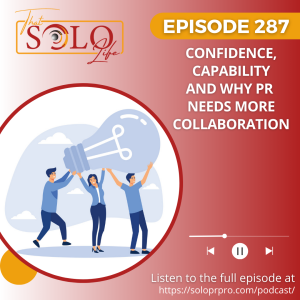
Monday Feb 17, 2025
Confidence, Capability and Why PR Needs More Collaboration
Monday Feb 17, 2025
Monday Feb 17, 2025
In This Episode
In this episode of That Solo Life, co-hosts Karen Swim, APR and Michelle Kane discuss the challenges and opportunities faced by solo PR practitioners. The key points in this episode include:
- Solo PR professionals can sometimes struggle with imposter syndrome and lack of confidence when comparing themselves to larger PR agencies.
- However, solo practitioners offer unique value, such as more personalized attention for clients and the ability to assemble specialized teams as needed.
- The PR industry should do more to embrace and empower solo and independent practitioners, rather than marginalizing them.
- There is a need for greater unity and collaboration across the broader communications industry to elevate the work of all PR professionals, regardless of their business model.
The conversation kicks off with a personal touch, as Karen shares her experience recovering from the flu, while Michelle expresses her gratitude for good health. The hosts acknowledge the unpredictable nature of the times we live in, setting the stage for a discussion about the unique struggles that solo practitioners encounter, particularly the pervasive issue of imposter syndrome.
The episode centers around an insightful article from PR Calvary that raises the question of whether PR freelancers have a confidence problem. Karen highlights the lack of a "center of gravity" for solo PR pros, contrasting the established reputation of large agencies with the often-overlooked contributions of independent practitioners. This comparison can lead to feelings of inadequacy, but the hosts emphasize that solo PR professionals bring valuable skills and perspectives to the table.
Michelle and Karen encourage listeners to embrace their strengths as solo practitioners. They discuss how clients often receive the attention of a team when working with larger agencies, while solo pros can offer personalized service and a tailored approach. The conversation shifts to the importance of owning perceived weaknesses, with Karen referencing Chip Griffin's advice to "stand tall in weakness." The hosts assert that being small is not a disadvantage; rather, it can be a unique asset that clients value.
As the discussion unfolds, Karen and Michelle advocate for greater collaboration between large agencies and solo practitioners. They envision a future where the industry embraces various working models and recognizes the contributions of independent professionals. The hosts express a desire for industry associations to unite in promoting the value of all communicators, regardless of their work structure.
The episode concludes with a powerful reminder for listeners to respect themselves and their work. Michelle encapsulates the message by encouraging everyone to "stand tall" and recognize their unique contributions to the field. The hosts invite listeners to share the episode and spread the positive energy, reinforcing the idea that working independently is a legitimate and respected career path.
Join us for this empowering conversation that aims to bolster the confidence of solo PR and marketing professionals, reminding us all that we are capable and deserving of success in our chosen paths.
Episode Timestamps
00:00:00 - Introduction and Personal Updates Michelle and Karen introduce themselves and share personal updates, including their thoughts on current events.
00:01:10 - Imposter Syndrome in Solo PR Discussion on imposter syndrome and the challenges solo PR professionals face in maintaining confidence.
00:02:29 - The Confidence Problem for PR Freelancers Exploration of an article discussing the lack of a central identity for solo PR pros compared to large agencies.
00:03:44 - Strengths of Solo PR Pros Karen emphasizes the unique strengths solo PR professionals bring to the table, including personalized attention and flexibility.
00:05:07 - Owning Your Strengths The importance of recognizing and owning perceived weaknesses as strengths in the solo PR landscape.
00:06:11 - Collaboration Between Agencies and Solos Discussion on the potential for collaboration and mutual benefit between large agencies and solo PR pros.
00:08:07 - The Need for Inclusivity in the Industry Michelle expresses the desire for greater inclusivity in industry events and recognition for all types of communicators.
00:10:21 - Frustrations with Industry Programming Karen shares frustrations about industry programming that often overlooks the needs of solo PR professionals.
00:11:45 - The Growing Trend of Independent Work Discussion on the increasing number of professionals working independently and the mainstream acceptance of this career path.
00:12:49 - Conclusion and Call to Action Encouragement for solo PR pros to stand tall in their unique strengths and to advocate for their place in the industry.
Resources:
- Do PR Freelancers Have A Confidence Problem — And Why?
- Small Agency Growth Alliance Newsletter (Sign up here)
Enjoyed the episode?
Please leave a review here - even a sentence helps. Share and tag us (@SoloPRPro, @KarenSwim) on social media so that we can thank you personally!

Monday Feb 10, 2025
What You Need to Know to Become a Solo PR Pro in 2025
Monday Feb 10, 2025
Monday Feb 10, 2025
In This Episode
In this episode of That Solo Life, co-hosts Karen Swim and Michelle Kane dive into the evolving landscape of public relations and marketing for solo professionals. With the job market in flux, is starting a Solo PR Pro business realistic in 2025? Karen and Michelle tackle that question as they discuss the opportunities and challenges of making the leap to a Solo PR Pro career.
The co-hosts discuss the various factors that might lead someone to make the leap into self-employment. They emphasize that while the media landscape has changed significantly, the core skills of communication and storytelling remain invaluable. They encourage listeners to think strategically about their unique skill sets and how they can serve clients effectively.
Michelle and Karen discuss the importance of having a solid plan before making the transition. They caution against jumping into entrepreneurship out of frustration and stress the need for thorough research on potential markets, industries, and client needs. The hosts highlight the value of maintaining steady employment while preparing to start a business, as it provides a financial cushion and the opportunity to learn and network without the pressure of immediate income.
Throughout the episode, the hosts share practical tips on how to cultivate business relationships that can yield valuable insights and potential leads. The hosts remind listeners that consulting opportunities can arise from job postings and that networking is key to planting seeds for future business.
As the discussion progresses, Karen and Michelle touch on the necessity of adapting to new technologies, such as AI, while still honing traditional skills like writing. The hosts emphasize that being a successful solo professional requires not just expertise in PR but also the ability to run a business effectively.
Michelle and Karen also reflect on the natural evolution of their own businesses, encouraging listeners to embrace change and remain flexible in their career paths. They remind us that starting a business is a journey filled with learning experiences, and it's essential to give ourselves grace as we navigate the ups and downs.
In closing, listeners are invited to share the podcast with others who might benefit from our insights. With nearly 300 episodes under our belt, we are committed to providing valuable content for PR pros and marketers working independently. Join us as we continue to explore the world of solo entrepreneurship and empower each other to thrive in our careers. Thank you for tuning in to That Solo Life!
Episode Timeline
00:00:00 - Introduction to That Solo Life
00:00:12 - The Journey of Solo PR Pros
00:01:10 - Navigating the Changing Media Landscape
00:02:00 - Opportunities for Solos in Today 's Market
00:03:36 - Finding Your Niche: Fishing Where the Fish Are
00:04:56 - The Importance of Planning Before Taking the Leap
00:06:12 - Researching Your Market and Skills
00:07:21 - Networking and Building Relationships
00:08:24 - The Value of Continuous Learning and Adaptation 0
0:09:42 - Embracing the Unknown in Your Solo Journey
00:11:53 - Evolving Your Business Over Time
00:14:16 - Trusting Your Instincts and Making the Leap
00:15:06 - Closing Remarks and Call to Action
Enjoyed the episode?
Please leave a review here - even a sentence helps. Share and tag us (@SoloPR, @SoloPRPro) on social media so that we can thank you personally!
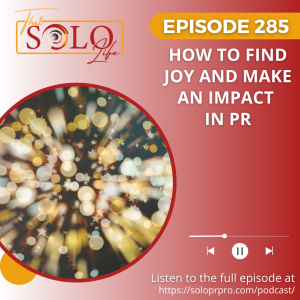
Monday Feb 03, 2025
How to Find Joy and Make an Impact in PR
Monday Feb 03, 2025
Monday Feb 03, 2025
That Solo Life Episode 285: How to Find Joy and Make an Impact in PR
In This Episode
In this episode of "That Solo Life," co-hosts Karen Swim, APR and Michelle Kane dive into the chaotic start of the new year, reflecting on the challenges faced by solo and small agency PR professionals in 2025. The year has kicked off with an overwhelming amount of information and events happening both in the United States and global. As chaos reigns, it is important for public relations to stay grounded.
Michelle and Karen explore the necessity of maintaining engagement in our work while also prioritizing our well-being. They highlight the significance of focusing on quality over quantity in our communications, especially in light of the evolving media landscape. The conversation touches on the importance of authenticity and truth in storytelling, particularly as misinformation continues to be a pressing issue in the public relations industry.
The hosts encourage listeners to step back from the emotional turmoil that can arise from constant engagement with social media and the news cycle. They advocate for finding joy in our work and innovating our approaches to communication. By fostering genuine connections within our communities—both for our clients and among ourselves—we can create a supportive network that helps us navigate these turbulent times.
Karen and Michelle also discuss the pitfalls of relying too heavily on social media platforms, reminding listeners that these platforms are not owned by us and can change at any moment. They stress the importance of building our brands on land we own, such as through email marketing and direct engagement with our audiences, rather than getting lost in the noise of social media.
As the episode wraps up, the hosts express their solidarity with fellow PR professionals, acknowledging the emotional toll the industry can take. They invite listeners to share their experiences and connect with the community, reinforcing the idea that we are all in this together. This episode serves as a reminder to prioritize our mental health, focus on meaningful connections, and continue to adapt in the ever-changing landscape of public relations.
Episode Timeline
00:00:00 - Introduction
The hosts introduce themselves and discuss the cold weather.
00:01:00 - Navigating Chaos
A reflection on the chaotic start to the year and the challenges faced by communications professionals.
00:02:30 - Staying True to Community
The importance of remaining connected to one's community amidst the chaos and misinformation.
00:04:00 - Finding Joy in Work
Advice on stepping back from emotional reactions and focusing on impactful work.
00:05:30 - The Reality of Misinformation
Discussion on the prevalence of misinformation and the need for authenticity in storytelling.
00:07:00 - The Role of Social Media
Exploring the dual nature of social media as both a tool for connection and a potential silo.
00:08:30 - Building True Community
Encouraging clients to engage directly with their audiences rather than relying solely on social media.
00:10:00 - Understanding Audience Segments
The importance of recognizing that not everyone will resonate with a brand or message.
00:11:30 - The Risks of Platform Dependency
A reminder that social media platforms are not owned by users and the risks of building a brand on them.
00:13:00 - Exploring Alternative Platforms
Highlighting the value of engaging on platforms like Reddit for genuine interactions.
00:14:00 - Staying Focused on Purpose
The need for PR professionals to filter out noise and maintain focus on their mission.
00:15:00 - Conclusion and Community Support
Wrapping up the discussion and encouraging listeners to connect and share their experiences.
Enjoyed the episode?
Please leave a review here - even a sentence helps. Share and tag us (@SoloPR, @SoloPRPro) on social media so that we can thank you personally!
